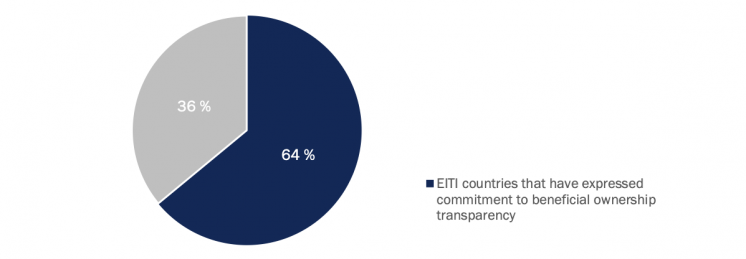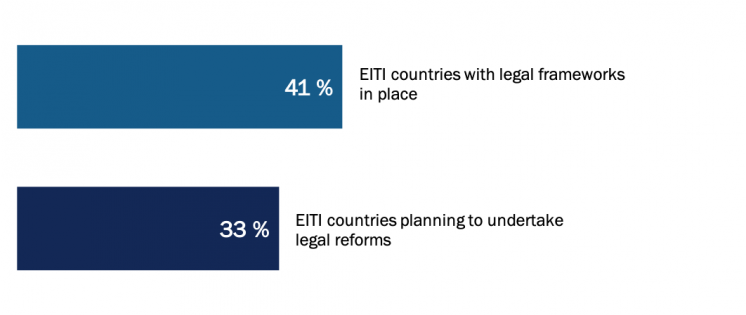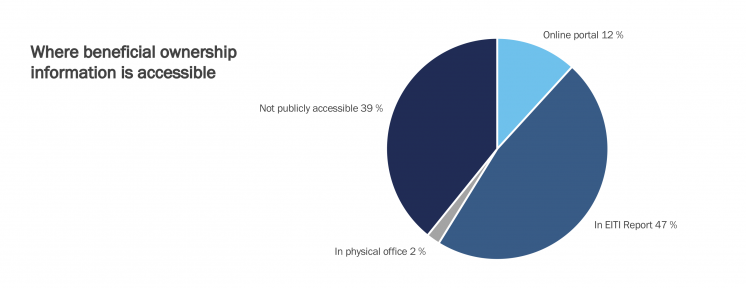
20/20 vision on corporate ownership
20/20 vision on corporate ownership
Who owns extractive companies? As of 1 January 2020, new EITI requirements for disclosing the owners of extractives companies will come into effect. In advance of this milestone, we take stock of progress made so far on beneficial ownership disclosure in EITI implementing countries.
Complex networks of corporate ownership are a significant feature of the modern business world. These ‘nested’ chains of corporation (think: Russian dolls) can obscure the identity of the real owners – those who control companies and those who ultimately benefit from them. In the extractive industries in particular, the potential windfalls from illicit revenue flows, money laundering or tax evasion can be substantial, which means that identifying the ultimate beneficiaries of revenue generated by extractives companies really does matter.
To fight anonymity, the EITI Standard was amended in 2016 to include new provisions on beneficial ownership transparency. By 2020, all oil, gas and mining companies that apply for or hold an interest in exploration or production licenses or contracts are required to publish the names of their real owners. This requirement will enter into force on 1 January, meaning that Validations of EITI implementation that begin after this date will include an assessment of beneficial ownership disclosures.
Our review of progress towards beneficial ownership disclosure so far covers three key steps in beneficial ownership transparency journey – political commitment, legal reform and the disclosure of ownership data. Placing data in the public domain in a form that can be used by stakeholders is essential for achieving real accountability.
Government commitment
As with many EITI requirements, the first step towards disclosure is a commitment by government to implement transparency.

Our review identified 32 EITI implementing countries which have announced their commitment to beneficial ownership transparency. Whilst this level of political support is encouraging, it is noteworthy that some of these commitments were made by previous administrations, and that in at least seven cases, the lack of political commitment to the ownership transparency agenda was identified as a challenge.
Further progress may rely on demonstrating the value of ownership transparency, an undertaking in which representatives from government agencies, industry and civil society will play a key role. Upcoming EITI Validations may also prove to be an entry point for action.
The International Secretariat will be working with representatives from governments, industry and civil society to help show how beneficial ownership transparency can support anti-corruption reforms and help mobilise domestic resources.
Legal reform

Of the 51 EITI implementing countries assessed in the recent survey, 21 had a legal framework in place to support beneficial ownership disclosure, and 17 had plans to introduce a supporting framework. Legislation typically falls into two categories; in countries such as Indonesia, Kazakhstan and the Kyrgyz Republic it has been sector specific, whereas in Argentina, Ghana, Peru, Ukraine and Zambia, beneficial ownership disclosure falls under company law and the legislation goes beyond the extractives sector.
Legislation in EITI implementing countries offers a wide menu of choice for countries looking to implement or strengthen legal frameworks supporting beneficial ownership. Earlier this year, the EITI documented these legal approaches, and identified eight topics covered by beneficial ownership legislation:
- Identification of the competent authority
- Identification of the reporting entities
- The definition of beneficial ownership
- Details of the beneficial owner’s identity
- Data verification
- Sanctions for false or non-disclosure
- Requirements for updating information
- Rules on access to information
Although substantial progress has been made in EITI countries, supporting legislation that predates EITI requirements may need to be supplemented by more specific measures to address gaps and potential shortfalls in EITI disclosure.
Releasing data

While disclosure is not yet comprehensive or systematic and still tends to be undertaken through EITI reports, 31 EITI implementing countries have released at least some data on the beneficial owners of companies. Disclosure mostly appears in EITI reports; to date, only two EITI implementing countries – the United Kingdom and Ukraine – have established public registers. Ukraine has also established a public register of politically exposed persons (PEPs). These are good examples of data that is systematically disclosed in a format that is open and accessible for public scrutiny.
Adding to this list of first movers, Nigeria took an important first step earlier this week by establishing a publicly-available database of beneficial owners of 56 companies in the oil and gas industry, drawing on information from EITI reporting and various government registers. While this information is not yet comprehensive, the register is searchable and can support civil society and others in pushing for improved data of Nigeria’s next Validation, to take place in January 2021.
2020: Making it happen
Beneficial ownership disclosure remains a complex and challenging area that requires accompanying legal reform to enact. Once data is made public, the focus should be on improving its quality and on considering how it can be used to improve accountability. Tools such as the recently-launched Remtrack application in Nigeria can provide the means to present data in a way that makes it accessible to citizens.
The EITI’s supporting company expectations place the onus on companies to take the lead in this area, by advocating disclosure. Some companies, such as Rio Tinto, have already taken the step of making ownership data public. Others have acknowledged its value, for example in informing due diligence investigations and yielding information on ownership structures of service providers and sub-contractors.
With the beneficial ownership requirement soon in effect, EITI implementing countries will need to accelerate their efforts towards revealing the real owners of extractive companies, so as to transform commitments into usable and accessible data.
Learn more:
Correction: The original article included a graph which incorrectly stated that 39% of countries have beneficial ownership data available in physical offices, while 2% do not have publicly accessible data. These figures were erroneously inverted. The graph has since been updated with the correct information.




